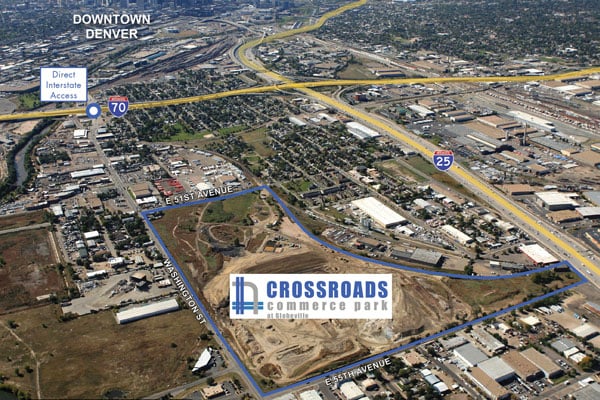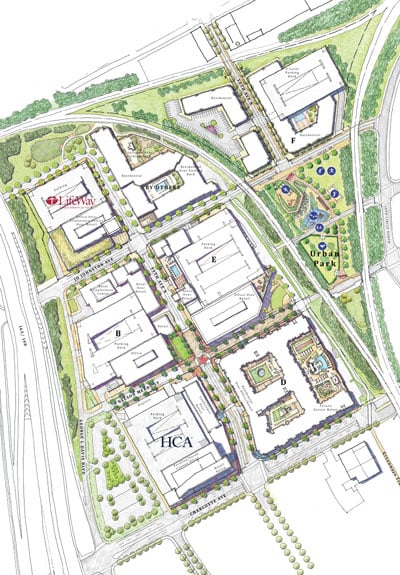Crossroads Commerce Park: From Blighted Brownfield to Thriving Infill Industrial Park

Long-term planning and collaboration among various partners across multiple jurisdictions have been key to creating a new industrial park in Denver’s Globeville neighborhood.
MORE THAN A century ago, the Asarco Globe Plant was operating as a metal smelting facility, employing nearly 3,000 Coloradans in Denver’s culturally rich Globeville neighborhood. Over the years, an array of industrial processes and uncontrolled disposal on-site contaminated the groundwater and soil with heavy metals. This contamination resulted in the property being identified as a brownfield site, and decades of investigation and remediation began.

Centrally located in Denver’s Central Industrial submarket, near the crossroads of Interstate 25 and I-70, Crossroads Commerce Park – shown here before vertical construction began – is located in both Adams and Denver counties.
When Asarco finally closed the plant entirely in 2006, the community was left with a blighted, abandoned and fenced 77.5-acre site. Land developer EnviroFinance Group LLC (EFG), working closely with the Colorado Department of Public Health and Environment (CDPHE), the U.S. Environmental Protection Agency (EPA), and Adams and Denver counties, managed the site’s environmental cleanup, achieving regulatory closure in June 2015. (Ongoing monitoring will continue for several more quarterly testing periods.)
In October 2014, as the environmental cleanup was underway, EFG entered into a purchase and sale agreement with Trammell Crow Company (TCC) for the site. TCC and joint venture partner Principal Real Estate Investors (PREI) began development of what is now known as Crossroads Commerce Park in 2015, breaking ground on nearly 1 million square feet of new industrial facilities. When completed by the end of 2019, Crossroads will feature 10 industrial buildings, seven of which are already completed and occupied by local, national and global tenants. The property is once again a regional economic engine helping to rejuvenate Denver’s Globeville neighborhood.
Strong Regional Collaboration
The fact that the site had a history of environmental contamination made redeveloping it no easy task, even after EFG had obtained regulatory closure, completed the horizontal infrastructure and readied the site for vertical development. Achieving the site’s full promise required partnership with a proven commercial developer.
TCC’s goal was to create a cohesive, holistic plan with an integrated design; negotiate effectively with local jurisdictions on entitlements; initiate design and use covenants that would add value and protect the aesthetic and functional integrity of the park, as well as the company’s investment; and craft a market vision and branding for prospective tenants and users through the commercial brokerage community. It also aimed to underwrite a capitalization plan, to attract the necessary equity and debt. Doing so required close coordination among all members of the development team, as well as with government agencies.
Strong collaboration with multiple entities, including CDPHE, the EPA, the Denver Urban Renewal Authority and Adams County Economic Development, as well as an intergovernmental agreement between Adams and Denver counties, has enabled Crossroads to kick off a renaissance in Denver’s Central submarket.
A Unique Opportunity
In 2014, it was becoming clear that demand for industrial space in this submarket would soon increase. Industrial tenants were being displaced from other parts of the region by a variety of activities. These included new infrastructure surrounding the National Western Complex, a more than 600,000-square-foot event venue that the state is renovating and expanding; the expansion of light rail through the region; and the gentrification of the River North (RiNo) neighborhood as it was being transformed from its historic industrial roots to an emerging mixed-use area.

When completed in late 2019, Crossroads Commerce Park will contain approximately 1 million square feet of space in 10 buildings, seven of which (buildings 1-7) have been completed and occupied.
Crossroads’ key location just five minutes north of downtown Denver presented a unique opportunity to develop in an infill area that hadn’t seen any significant construction in more than 10 years. With immediate access to both Interstate 70 and I-25, the two major highways traversing the Rocky Mountain region, the site provides a central location for distribution. Crossroads features low sales tax rates for companies located in unincorporated Adams County, along with a Denver mailing address. Economic incentives available to businesses locating there include enterprise zone tax incentives and other tax rebates.
Challenges and Solutions
While Crossroads is located at the crossroads of two major freeways, the site itself slopes more than 40 feet from 55th Avenue on the north to 51st Avenue on the south and is bifurcated by overhead power lines as well as the county line. (One side of the park is in Adams County while the other is in Denver County.) It was also subject to numerous limitations created by site remediation, including use restrictions. Housing and schools are prohibited; development on the site is generally limited to industrial uses.
The development team chose to incorporate a two-pronged strategy. The larger northeastern portion of the site was designed for three institutional-grade, speculative distribution buildings. On the balance of the site, because of the inability to build under power lines or across county lines, the site plan called for seven build-to-suit for-sale buildings to complete the development.
Design Standards. To ensure a consistent standard of development throughout the entire site, as well as to improve functionality for the surrounding community, TCC filed a planned unit development (PUD) plan with Adams County. The document included a description of the public and private infrastructure serving the park, restricted permitted uses within it and established design guidelines for its structures. The PUD zoning governing the site required the creation of a third-party design review committee (DRC) to apply uniform design guidelines in both counties. The DRC is comprised of five members, including landowner stakeholders, an architect, a commercial broker and a Globeville neighborhood representative.
The PUD, DRC and design guidelines ensure a high-quality and uniform standard of design for all buildings at Crossroads Commerce Park, regardless of jurisdiction. They specify features that include 18- to 32-foot clear height ceilings; energy-efficient modern design, including 60-mil thermoplastic polyolefin (TPO) cool roofs, which help reduce the amount of solar energy retained by a building; clerestory windows that provide natural light; ESFR sprinkler systems; and modern truck courts with significant car and trailer parking.
Financing Strategies. EFG was instrumental in developing an intricate financial plan utilizing a combination of grants, debt and equity to acquire, remediate and develop the site infrastructure. These included private financing, Asarco bankruptcy funds, an Adams County HUD loan, tax increment financing, Denver Community Development Block Grant (CDBG) funds, and funding from the newly created Crossroads Commerce Park Metropolitan District. This district was created to represent the park’s collective ownership and oversee the maintenance of its shared infrastructure.
TCC attracted institutional capital to finance the vertical development by engaging Principal Real Estate Investors as an equity partner. PREI saw Crossroads as a unique infill opportunity for industrial property, a favored asset class among institutional investors. PREI therefore decided to invest both equity and preferred equity in lieu of debt for the leasable buildings. Colorado Business Bank worked with TCC to establish a programmatic loan for the build-to-suit for-sale portion of the site, recognizing that this location could fill an unmet niche. The bank viewed this as an opportunity to expand its commercial lending by committing to finance these seven build-to-suit structures.
Smart Land Uses. The initial remedy for the former Asarco site was based on a “cap and fence” plan, pursuant to the 1993 consent decree, which would have resulted in a vacant, fenced site that could not be redeveloped. The alternative remedial approach implemented by EFG, which involved abatement and demolition of 26 structures totaling almost 1 million square feet, groundwater and soil remediation, and installation of on-site and off-site utilities and roadways, allowed for full redevelopment of the site. Remediation funding served double duty, both cleaning up the site and preparing it for redevelopment simultaneously.
Crossroads Today
Crossroads Commerce Park offers a variety of building configurations, including front park/rear load, cross-dock, and front park/front load. Its 10 buildings can accommodate large distribution users as well as small bay users. The final site plan resulted in three for-lease buildings totaling 673,000 square feet on the northern end of the site and seven for-sale buildings totaling 350,000 square feet on the balance of the site.
All horizontal infrastructure was completed and the three large speculative buildings constructed by the end of 2016. Build-to-suit for-sale opportunities began in August 2015, starting with a 61,900-square-foot facility built for Empire Staple Co. on the northwest corner of the site that was completed in February 2016.

Since then, TCC has acquired additional land parcels on a phased, “just-in-time” basis. Two additional build-to-suit projects commenced in 2016, a 52,600-square-foot building completed in January 2017 and sold to Sierra Pacific Industries (SPI), and a 69,000-square-foot building completed in June 2017 for Inline Distributing Co. Most recently, Stillman Wholesale Meat Co. announced its relocation to a new 60,000-square-foot building to be completed in the second quarter of 2018. Remaining build-to-suit opportunities include three buildings ranging from 17,000 to 58,000 square feet, all located on the southern portion of the site.
Results
The Globeville neighborhood has benefited from the major infrastructure improvements made within and along the perimeter of the park, including the expansion of public streets as well as the addition of new private roads, regional drainage detention, sidewalks and landscaping, and a new traffic signal at Washington Street and 55th Avenue. The new sidewalks and roads enable employees and visitors to access nearby amenities and services, including fast food outlets and bars, along Washington Street as well as local outdoor recreation opportunities.
Since TCC announced its plans for Crossroads, the Central industrial submarket has surged with additional new development. More than 1.3 million square feet of additional space is proposed or underway within 5 miles of the site, in four projects: Hub 25, Central 62, ProLogis Park Center and CenterCore Distribution Center.
As of the third quarter of 2017, more than 300 jobs have been accommodated at Crossroads, approximately one-quarter of which are new to the region. This number could rise to a total of as many as 800 jobs, depending upon the park’s ultimate users. Crossroads’ existing employers are all strong public and private investment-grade companies.
Crossroads Commerce Park has been transformed from a brownfield site into a vibrant economic generator of new employment. As Crossroads nears completion, it has become clear to Trammell Crow Company and its partners that their collaboration and continuing focus on the long-term goal of creating a vibrant, energizing employment center in the Globeville neighborhood have been key to the project’s success. That collaboration and focus have enabled them to overcome multiple challenges over many years, including the difficulties involved in working across multiple jurisdictions, bankruptcy and funding concerns, and environmental issues caused by decades of contamination and neglect.
Crossroads has received numerous awards. In 2016, NAIOP Colorado named it the chapter’s Industrial Development of the Year. Overall, the development of Crossroads Commerce Park has brought the former Asarco smelter site full circle. Once again, it is an economic engine for the region that is helping to revitalize both the Globeville neighborhood and Denver’s urban core.
Bill Mosher (bmosher@trammellcrow.com) is senior managing director and Ann Sperling (sperling@trammellcrow.com) is senior director, Trammell Crow Company | Denver


